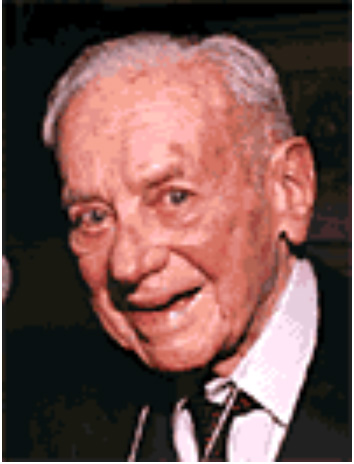
A former secretary of state — General Alexander M. Haig — sang his praises, after joining in on a chorus of “Happy Birthday.” A former student — Philadelphia Mayor Edward G. Rendell, C’65 — presented him with a replica of the Liberty Bell. And a couple of hundred members of the Foreign Policy Research Institute came to honor Dr. Robert Strausz-Hupé, Gr’46, the diminutive old man who co-founded their organization more than 40 years ago at Penn, back when he was known as a popular professor of political science and had not yet embarked on his 20-year career as an ambassador.
The FPRI is no longer connected with the University, but since Strausz-Hupé also founded the discipline of international relations at Penn, it was appropriate that Dr. Walter McDougall, Penn’s Alloy-Ansin Professor of International Relations and History, gave the keynote speech at the March celebration honoring Strausz-Hupé’s 95th birthday.
After the “ideal of multinational harmony symbolized by the Austrian Hapsburg monarchy disappeared when he was fifteen,” McDougall recounted, Strausz-Hupé “recognized in America the only viable model for a new multinational harmony.” And so he went on to serve his adopted country “from Pearl Harbor to the end of the Cold War, by teaching Americans how to reconcile the exigencies of geopolitics with their liberal values, by inspiring a generation of students at Penn, by helping to found the academic discipline of international relations, by establishing the FPRI as a feisty alternative to Establishment opinion, and finally by advising presidents and serving five times as ambassador.” His ambassadorial stints included Turkey, NATO, Sweden, Belgium, and Sri Lanka.
While others were “obsessed with the crisis of the day,” McDougall added, “Strausz-Hupé offered a strategy, philosophy, and vision that saw the Cold War as ephemeral, that identified the fatal flaws in the Soviet system, and that spied in the institutions of the West the foundations of an order that would replace the Cold War. No wonder critics on the Left and Right knew not what to make of him: he was decades ahead in his thinking.”
“I think I have been misunderstood for most of my life,” acknowledged Strausz-Hupé, the author of such seminal books as Geopolitics: The Struggle for Space and Power, Protracted Conflict, and Diplomacy and American Foreign Policy. “But ‘misunderstood’ may always mean that I was not articulate enough. I confused my friends and, even more dangerous, I confused my foes … Many have believed that, deep down, I was a hater of Russia and things Russian. It is not so. I have always admired Russian civilization and its great literary tradition. It was Soviet statecraft that I hated.
“I do confess to the charge, however, that I tend to see America’s virtues and not her faults. For this you will have to forgive me. It is a habit that I cannot give up, and which I will not give up.
“I had not expected to live this long,” he told the audience at the end of the evening. “But I will not apologize for doing so. One of the great satisfactions of old age — perhaps the only one — is that my critics have gone silent, one after another, until only one voice alone is left — mine.”




